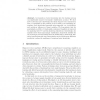Free Online Productivity Tools
i2Speak
i2Symbol
i2OCR
iTex2Img
iWeb2Print
iWeb2Shot
i2Type
iPdf2Split
iPdf2Merge
i2Bopomofo
i2Arabic
i2Style
i2Image
i2PDF
iLatex2Rtf
Sci2ools
ECML
2005
Springer
2005
Springer
Rotational Prior Knowledge for SVMs
Incorporation of prior knowledge into the learning process can significantly improve low-sample classification accuracy. We show how to introduce prior knowledge into linear support vector machines in form of constraints on the rotation of the normal to the separating hyperplane. Such knowledge frequently arises naturally, e.g., as inhibitory and excitatory influences of input variables. We demonstrate that the generalization ability of rotationally-constrained classifiers is improved by analyzing their VC and fat-shattering dimensions. Interestingly, the analysis shows that large-margin classification framework justifies the use of stronger prior knowledge than the traditional VC framework. Empirical experiments with text categorization and political party affiliation prediction confirm the usefulness of rotational prior knowledge.
Related Content
| Added | 27 Jun 2010 |
| Updated | 27 Jun 2010 |
| Type | Conference |
| Year | 2005 |
| Where | ECML |
| Authors | Arkady Epshteyn, Gerald DeJong |
Comments (0)

